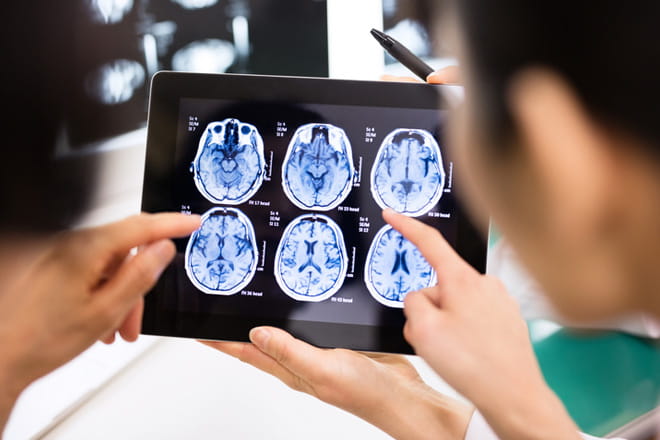
Advanced stroke care in Wisconsin
When seconds count, doctors at Ascension Wisconsin stroke centers work quickly to understand the cause of your symptoms and deliver the care you need.
-
How do I know if I'm having a stroke?
Stroke symptoms can come on suddenly. Call 911 and go to the nearest ER if you experience any of these stroke symptoms:
- Arm weakness
- Face drooping or uneven smile
- Lost or unclear vision
- Speech difficulty
- Sudden loss of balance
-
What is a stroke?A stroke occurs when there is a disruption in the blood supply to the brain. This disruption can come from a blocked blood vessel in the brain or a blood vessel that ruptures and bleeds into the brain. When you are experiencing a stroke — every second counts. Call 911 and go to the nearest ER.
-
What should I do if I think someone else is having a stroke?
If you believe that you or a loved one is experiencing a stroke, remember this: BE FAST
Balance: Check for sudden loss of balance
Eyes: Ask if vision is lost or unclear
Face: Look for an uneven smile
Arm: Check if one arm is weak
Speech: Listen for slurred speech
Time: Call 911 right away
Ascension Wisconsin Stroke Centers are located at our hospitals and provide 24/7 care.
-
What is an ischemic stroke?A blood clot that travels to the brain, blocking blood flow, can cause an ischemic stroke. If a patient receives clot-busting medication within three hours of the first symptoms of an ischemic stroke, they are more likely to fully recover.
-
What is a hemorrhagic stroke?A hemorrhagic stroke occurs when a weakened blood vessel in the brain ruptures and bleeds. This bleeding puts pressure on brain tissue, causing damage and potentially life-threatening complications. Hemorrhagic strokes are caused by a brain aneurysm. One type is a cerebral or intracranial aneurysm that causes an area of a blood vessel to balloon and weaken. Another type of brain aneurysm is a berry or saccular aneurysm because a sac of blood forms and hangs from an artery in the brain. Aneurysms can either leak blood slowly (leaking brain aneurysm) or burst suddenly (ruptured brain aneurysm).
-
What is an arteriovenous malformation (AVM)?Arteriovenous malformations (AVMs) are abnormal tangles of blood vessels in the brain that can rupture and bleed into the brain, causing a stroke.
-
What is a mini-stroke, also called a transient ischemic attack (TIA)?When someone experiences stroke symptoms that go away in a short period (typically less than an hour), it may be considered a TIA. When blood flow to the brain is interrupted for a short period (usually less than five minutes), it may be a sign of a future stroke. TIA is an emergency, like a stroke. If you experience signs of a stroke or TIA, don't wait to see if the symptoms go away.
-
How is a stroke treated?The sooner you get to the ER, the more options there may be for treatment. Medications and minimally invasive stroke interventions help prevent clots and dissolve blockages to restore blood flow to the brain. Endovascular procedures are used to prevent a blood vessel from rupturing. Your doctors, nurses, and rehabilitation therapists help you recover after a stroke and help prevent a future stroke.
-
What can I do to help prevent a stroke?Certain risk factors can increase your risk of stroke, including age, diabetes, smoking, obesity, high blood pressure and cholesterol, heart disease, family history of stroke, and atrial fibrillation (AFib). While you cannot change some risk factors, such as age and family history, there are things you can do to help lower your risk of stroke. Start by talking with your doctor and scheduling an annual wellness visit. Together, you can create a care plan that helps lower your risk factors and manages conditions like AFib effectively.
